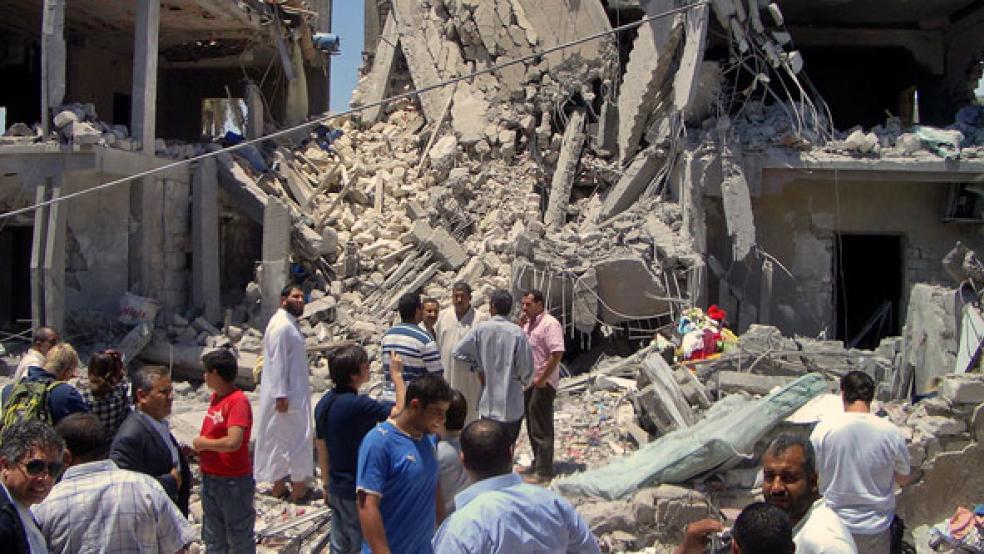Even before outgoing Defense Secretary Robert Gates caused a ruckus earlier this month when he declared that NATO faced “a dim if not dismal future,” the long-term viability of the alliance was in jeopardy.
While America’s financial commitment to the North Atlantic Treaty Organization and defense has remained steady, European spending in both areas has decreased, forcing the United States to shoulder the largest portion of NATO’s $2.8 billion annual budget in the alliance’s 62-year history. And the war in Afghanistan and fledging NATO mission in Libya shows how member states individually undermine the alliance’s global strategy and cause political problems at home.
Gates’ speech led to a lot of diplomatic handwringing in European capitals, where politicians have become comfortable with the U.S. as NATO’s primary sponsor and military point man. In recent years, according to Kurt Volker, former U.S. ambassador to NATO under President George W. Bush, Europeans have become complacent about the mission of the alliance.
“Russia’s not a threat, and Europeans don’t like expeditionary missions,” said Volker. “They don’t believe they work very well.”
There is no argument that America is NATO’s sugar daddy. In 2009 and 2010, the United States kicked in $408 million and $430 million, respectively, to NATO’s military budget; $462.5 million is earmarked for 2011 spending.
The U.S. contributed $66.1 million and $84.1 million to NATO’s civil budget in 2009 and 2010
respectively. Some $90 million has been appropriated for this year’s budget.
And U.S. contributions to the organization’s security investment program, which pays for NATO installations and facilities, were $330 million and $197 million in 2009 and 2010, respectively, with $259 million earmarked for 2011.
Total U.S. financial contributions make up 25 percent of NATO’s budget. Germany, the U.K. and France are the largest NATO contributors behind the U.S. Yet the differences between the contribution amounts are substantial. Germany contributes 18 percent, while France and the United Kingdom contribute 9 percent. From 2000 to 2003 between 3.1 and 3.2 percent of America’s GDP to NATO, while Western Europe contributed between 2 and 1.9 percent of its GDP.
At the same time, Germany and the U.K. are in the midst of deep defense cuts that Secretary of State Hillary Clinton has warned could cause long-term damage to strategic alliances, including NATO.
“The United States has decided it needs to behave in a way in which it undertakes any problem it sees fit,” said Winslow Wheeler, director of the Straus Military Reform Project at the Center for Defense Information. “The Germans haven’t made that decision, and neither have most of the other NATO countries.”
Past U.S. Defense secretaries have defended the size of the U.S. contribution as necessary to secure national security interests. Gates’ speech was a clear break from this policy.
Afghanistan and Libya
European spending decisions, the attitudes toward conflict they represent, and the political problems caused by the aging alliance are illustrated on the ground in NATO’s two active battlefields—Afghanistan and Libya.
In Afghanistan, the vast majority of the fighting is being done by American troops, who, in turn, have suffered the heaviest casualties. According to icasualties.org, 1,623 American soldiers have been killed. The UK has lost 374 soldiers, while Canada, also a NATO member, has suffered 156. Germany, Europe’s largest NATO member, has suffered 54 casualties. While Germany is constitutionally forbidden to engage in offensive warfare, it was an active participant in NATO operations in Afghanistan until a 2009 incident in which German troops called in an airstrike that killed Afghan civilians.
The event kicked off a public outcry against German involvement in the war, which, combined with displeasure at Berlin’s handling of the euro crisis, has resulted in major losses for German Chancellor Angela Merkel’s ruling Christian Democrat party in regional elections. Since then, Germany has largely withdrawn from the war, ceding control of Kunduz, a strategically important providence in Northern Afghanistan, to insurgents. German troops are largely seen as waiting to go home.
At the same time, Germany has refused to participate in military aspects of the NATO operation in Libya, leaving primary responsibility for fighting to the British and French and supplying bombs and spare parts to the U.S. Yet German Foreign Minister Guido Westerwelle formally and unilaterally recognized Libya’s National Transitional Council, made up of the rebels opposing Muammar el-Qaddafi. No other NATO countries have made this formal recognition, showing a lack of coordination across the alliance.
The Libya conflict, like the Afghan conflict for Merkel, has caused political headaches for President Barack Obama. Without U.S. cooperation, NATO’s Libya operation would have little chance of success. The White House, however, has faced sharp rebukes from Republicans who have criticized the President for involving America in yet another conflict. House Republicans are now considering a number of legislative actions to punish the Obama administration for acting without consulting Congress.
"The fact that the White House ignored the advice of the Justice Department and flouted the War Powers Resolution calls for some serious accountability,” said Kevin Smith, a spokesperson for House Speaker John Boehner. “We're discussing all available options with our members to hold the administration to its obligations.”
Former NATO ambassador Volker said these political realities undermine the alliance and show that sustained NATO operations in the future aren’t likely.
“The lesson the Europeans are learning is that NATO no longer works,” Volker said.
Related links:
U.S. Warns Europe over NATO’s Future (ABC News)
How will the Libya conflict play out? (CNN)
NATO’s Future: Let Europe Bear the Cost of Defending Europe (Atlanta Journal Constitution)





